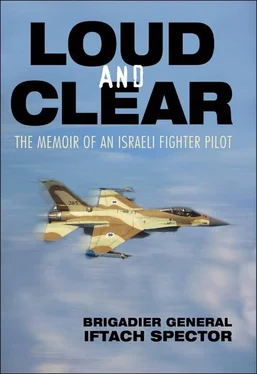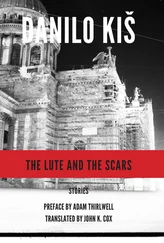THE WIVES’ REBELLION continued. Michal Yoffe was ready with five or six pages. She read her speech from them.
“I met Ali a few months ago,” she began, “and Ali, in her wonderful, easy way, said, ‘Michalush, why don’t you write something nice for the meeting.’ I was so glad we, the women, mattered. Suddenly they want to hear us, too.”
The Yoffes were part of my own life. Duby is the son of Abraham and Mitka Yoffe, both of them ex-Palmach members. Their blond child grew up and in 1972 arrived at the Orange Tails to fly and fight with me. Duby began as a reckless boy. The circle I drew in an effort to figure out his personality had a grave breach, which I called irresponsibility. So I treated him harshly and punished him when necessary. I thought if I didn’t act decisively now I would lose him. I think, and Duby also knows, that I was right. He is alive.
During the Yom Kippur War I kept Duby in the hotshot group, whom I warned not to leave formation no matter what.
“You stick to the leader’s wing like glue,” I told them, “and do what he does. Don’t even think about MiGs. MiGs are for other people, not you,” I warned them seriously, and Duby did his job during the war and made no trouble. And I was happy to see that my next prophecy—that he would get his MiGs some other time—also came true.
Duby is a very good-looking guy, light-haired and tall, and with a winning smile. His affair with Michal, who was a cute and verbal operations clerk, was not without difficulties. Michal is the daughter of Ezer Weizman, the former air force commander and later minister of defense and president of Israel. Between the Yoffe and Weizman families there were some past issues, but the young, handsome couple refused to carry the same baggage as their parents and so united the families.
MICHAL CONTINUED HER story. “On the morning of Independence Day, early May 1981, I was getting up with my first son, Iftach, then a two-year-old. It was a typical late spring morning in Ramat-David housing. The boy toddled off to kindergarten. The air was clear and I felt no premonition. For weeks Duby had been reassuring me there was no problem, it was going to be a simple operation, just get into Iraq, total surprise, pull the trigger, and out.”
Duby had been lecturing her for weeks! Karen’s surprise was hardly over, and now here was Michal. I couldn’t help thinking, Oh, boy, had I known this in 1981, Duby would have been locked up again, this time not alone and surely not for just thirty-five days. But I kept quiet. Tammuz had been bombed twenty years ago, and my time of imposing discipline also was over.
“I asked Duby,” continued Michal, “‘Why did you tell me? Isn’t this a violation of orders?’ and Duby answered, ‘If I am hanged in Baghdad’s Central Square, I don’t want you to be surprised, since you would never forgive me. It’s important to me that you know why I’m risking my life.’ For the first time in our life together,” said Michal, her eyes on her papers, “Duby revealed his vulnerability.”
That was true. Duby was never pathetic. He was the total opposite, light and happy, the classic golden boy, succeeding in everything without perceptible effort, enjoying himself and finding grace in everybody’s eyes. Such dark musings really didn’t fit him. And I thought, “So this was what my pilots, even lighthearted ones such as Duby, were talking about on Independence Day 1981, a whole month before the mission? Duby, Raz’s deputy and supposedly not in the loop, knew of the forthcoming operation. Who else knew? Who among them all didn’t?”
“And on the morning of the attack, on the Feast of Weeks, the housing became empty,” continued Michal, “and little Iftach and I went to spend the holiday at my parents’ home. We sat in the pickup that took us to Caesarea and hugged like two abandoned children.”
She couldn’t talk freely even with her father, Ezer Weizman. He, who was accustomed to know everything, was out of the loop.
“My father asked, ‘Where is Duby? Let’s call him,’ and I lied to him. ‘Duby is on standby, Duby is tired from a hard week, he is asleep in the ready room now, we can’t call him.’ I disconnected myself from everything, kept busy with Iftach’s doll, with his diapers. No, I am not at the Central Square in Baghdad, I am here in Caesarea with my parents and my child. And then, at four o’clock in the afternoon, the telephone rings. Mitka, Duby’s mother, who was then a secretary in the government, was on the line: ‘Michalush, pour a glass of cognac.’ I couldn’t hold it anymore and told Father, ‘Duby is on his way back from Baghdad.’”
Michal fell silent. I kept my eyes on the floor.
‡
ILAN RAMON GOT UP TO SPEAK. Our astronaut was, as usual, very well turned out, and very handsome in his crew cut. He began by declaring that he would speak briefly, and he did. He also said that his talk was going to be out of synch with our conversation, and in this he was totally wrong.
“As number eight, the tail-end charlie, the one destined to be hanged in Baghdad’s Central Square…” That’s how he began.
Again, Central Square.
There was some truth behind this macabre image. There is a common belief among fighter pilots that the tail of the formation is a more risky place to fly than at its head, where the leader flies, and that the chance of the last ones being hit is greater.
There is some logic to it, together with very meager statistics, and a lot of superstition. The problem emanates from the fact that the more senior and experienced pilots fly in the lead: they navigate and command. In the air battle commanders can’t lead from behind—find the target and make critical decisions in changing situations. The natural outcome is that the younger, less experienced pilots fly in the back, and there they nurse their fears. Actually, in the Yom Kippur War I was aware of this superstition, and assigned senior leaders—mainly myself—to fly sometimes as tail-end charlie. I believe I occupied that slot for three or four missions while others led the formation. It had some advantages: it provided opportunities to supervise other leaders in action, and it gave everybody a good lesson. In short, I never gave much credence to the myth that the tail end of the formation was more hazardous.
But now, in 2001, when I first heard what kind of thoughts were going through the minds of the two pilots in the last pair—Relik with his Concentration Camp Stutthof and Ilan with his Baghdad’s Central Square—I thought maybe I hadn’t been tuned in enough to the feelings of my men. Perhaps I had been too remote from them—an “old man,” a senior, busy officer. I had lost contact with their secret pilots’ culture and didn’t understand the vocabulary. Did it come from being burdened with work? Had I really lost contact? Or had my inner child refused to regard that mission as a really serious risk?
I do remember the usual operational tension in me before that mission, more or less the same as in many flights into Egypt and Syria. After all, Baghdad’s Central Square didn’t frighten me more or less than those of Damascus or Cairo. So when those morbid images were revealed to me for the first time in 2001, I was angry at myself. How dumb was that, experienced combat leader that I was supposed to be? And then I asked myself whether my squadron commanders, Raz and Nahumi, had been any more tuned in than I. Did they sense what was going on with their men? What did they do about it? How come I haven’t heard a word from them?
ILAN CONTINUED, “MY MOTHER is a survivor of the Holocaust. She survived Auschwitz. And before I went on the Tammuz operation—and I understood there was a chance of my staying on in Iraq—I thought about my mother, and Auschwitz, and what had happened to the Jews, and decided that such a thing must never be repeated. And if for that reason I must remain in Iraq, well, so be it.”
Читать дальше












